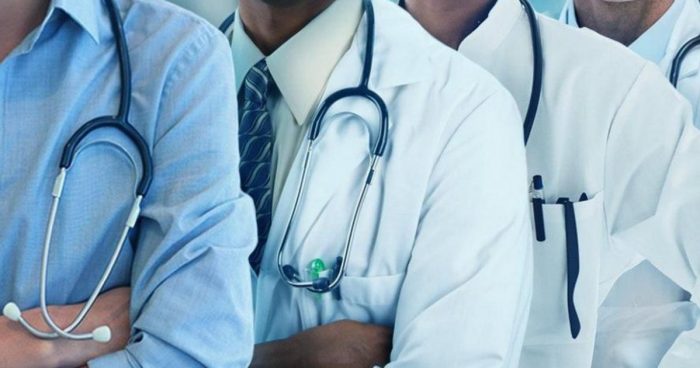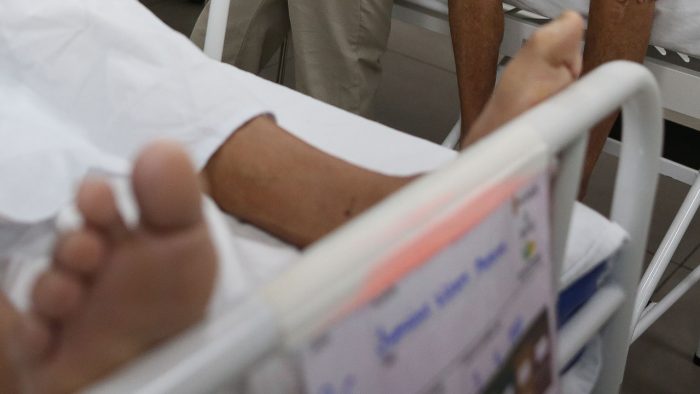Resident doctors in the country have commenced an indefinite nationwide strike following the expiration of the 14-day ultimatum issued to the Federal Government.
Among the demands of the doctors are immediate implementation of the revised hazard allowance and payment of the COVID-19 inducement allowance as “agreed by government and healthcare workers” three months ago. They also want an immediate payment of all arrears owed doctors in federal and state tertiary health institutions, arising from consequential adjustment of the national minimum wage.
Meanwhile, there is fear that the industrial action may worsen the poor doctor-to-patient ratio and increase the number of deaths due to coronavirus infection, although Sokombo said doctors treating Covid-19 patients were not going on strike immediately.
Several studies have shown that frequent healthcare workers’ strikes result in the closure of public healthcare institutions, thereby preventing Nigerians’ access to quality health services.
It was gathered that the resident doctors, who are the ‘militant arm’ of the Nigerian Medical Association (NMA), the umbrella body of all doctors in Nigeria, represent about 40 per cent of physicians in the country.
Contrary to the World Health Organisation (WHO) recommendation of 1:600 doctor-patient ratio, Nigeria currently has one doctor attending to 6,000 patients.
According to the NMA, there are 72,000 registered Nigerian doctors with over 50 percent practicing outside the country. Consequently, there are less than 40,000 doctors in an estimated population of 196 million.
This means that with the number of resident doctors in Nigeria put at about 16,000 (that is 40 per cent of 40,000), it will leave the country with just 24,000 doctors, including consultants and those in private practice. The situation will further reduce the country’s doctor-to-patient ratio from 1:6,000 to 1: 10,000.
Indeed, Nigeria is still far from the recommendations of the WHO on the required number of medical personnel to cater efficiently for its teeming population. However, figures from the Federal Government differ: the ratio of doctor-to-patient is 1: 2,753, which translates to 36.6 medical doctors per 100,000 persons.
Figures from the Federal Ministry of Health (FMoH) indicate that 74,543 medical doctors are registered with the Medical and Dental Council of Nigeria (MDCN) as at March 4, 2020.
The National Universities Commission (NUC) had in January 2020 said Nigeria needed about 300,000 medical doctors to meet the doctor-patient-ratio of 1:600 recommended by the WHO.
The Executive Secretary, NUC, Prof. Abubakar Rasheed, said the current “doctor-patient ratio in the country stands at 1: 3,500.”
According to him, the nation’s medical schools produce about 3,000 doctors yearly and this is not enough to achieve the WHO standards to deliver on health care services.
President of the National Association of Resident Doctors (NARD), Dr. Aliyu Sokomba, who announced commencement of the strike at a press conference yesterday in Abuja, said NARD’s members attending to Covid-19 patients at designated treatment and isolation centres were exempted from the strike for two weeks after which, if their demands were not met, they would also be co-opted to join the industrial action.
He explained that the exemption was in recognition of the intervention of the speaker of the House of Representatives, the chairman of the House Committee on Health Services and other stakeholders as well as a demonstration of NARD’s goodwill to Nigerians.
Meanwhile, there is fear that the industrial action may worsen the poor doctor-to-patient ratio and increase the number of deaths due to coronavirus infection, although Sokombo said doctors treating Covid-19 patients were not going on strike immediately.
Several studies have shown that frequent healthcare workers’ strikes result in the closure of public healthcare institutions, thereby preventing Nigerians’ access to quality health services.
It was gathered that the resident doctors, who are the ‘militant arm’ of the Nigerian Medical Association (NMA), the umbrella body of all doctors in Nigeria, represent about 40 per cent of physicians in the country.
Contrary to the World Health Organisation (WHO) recommendation of 1:600 doctor-patient ratio, Nigeria currently has one doctor attending to 6,000 patients.
According to the NMA, there are 72,000 registered Nigerian doctors with over 50 percent practicing outside the country. Consequently, there are less than 40,000 doctors in an estimated population of 196 million.
This means that with the number of resident doctors in Nigeria put at about 16,000 (that is 40 per cent of 40,000), it will leave the country with just 24,000 doctors, including consultants and those in private practice. The situation will further reduce the country’s doctor-to-patient ratio from 1:6,000 to 1: 10,000.
Indeed, Nigeria is still far from the recommendations of the WHO on the required number of medical personnel to cater efficiently for its teeming population. However, figures from the Federal Government differ: the ratio of doctor-to-patient is 1: 2,753, which translates to 36.6 medical doctors per 100,000 persons.
Figures from the Federal Ministry of Health (FMoH) indicate that 74,543 medical doctors are registered with the Medical and Dental Council of Nigeria (MDCN) as at March 4, 2020.
The National Universities Commission (NUC) had in January 2020 said Nigeria needed about 300,000 medical doctors to meet the doctor-patient-ratio of 1:600 recommended by the WHO.
The Executive Secretary, NUC, Prof. Abubakar Rasheed, said the current “doctor-patient ratio in the country stands at 1: 3,500.”
According to him, the nation’s medical schools produce about 3,000 doctors yearly and this is not enough to achieve the WHO standards to deliver on health care services.
Sokomba faulted the non-payment of the Covid-19 hazard inducement allowance to all health workers across the country in spite of repeated promises by government. He alleged insincerity of officials of the executive arm of government in paying the outstanding salary shortfall of 2014, 2015 and 2016 under the guise of appealing the decision of the National Industrial Court.
The NARD president expressed concern over the plight of members of the association in state hospitals such as the non- domestication and non-implementation of the Medical Residency Training Act, the non-implementation of appropriate salary structure, non-payment of salaries, and recently, the slashing of salaries of doctors and other healthcare workers by Kaduna and Kogi states.
Sokomba decried the sorry state of the healthcare delivery system in the country which, according to him, is characterized by perpetual unavailability of personnel protective equipment for workers in the hospitals with the attendant increase in infection rates and unnecessary suffering of patients and their relatives following the use of obsolete equipment, machines and technology.
NARD urged the governments to provide adequate personal protective equipment for all healthcare workers, ensure universal implementation of the Medical Residency Training Act in all federal and state hospitals and ensure pay parity among doctors of equal cadre.
The association advocated provision of funding for medical residency training in the 2021 Appropriation Bill even as it called for stoppage and immediate refund of all illegal, unjust and callous cut in salaries of its members by Kaduna and other states.
“We will continue to appreciate President Muhammadu Buhari for his commitment to the welfare of Nigerians. We appeal that he calls relevant agents/agencies to order from deliberately creating chaos to destabilize his administration. We appeal to our fellow lovely Nigerians to bear with us and understand this as a battle to save the almost dead health sector.
“NEC noted the commitment of the National Assembly to implementing the Medical Residency Training Act by ensuring inclusion of the residency funding into the reviewed 2020 budget.”
In a similar development, there is fear of scarcity of pharmaceutical products, especially those needed during this COVID-19 pandemic, as pharmacists in the country are planning to down tools in 14 days.
The Pharmaceutical Society of Nigeria (PSN) yesterday petitioned President Buhari over the appointment of A. T. Mora as chairman of the Pharmacists Council of Nigeria (PCN), instead of Alhaji Yaro Budah whom it recommended to the minister for the position, threatening to go on an indefinite strike in two weeks if the decision was not reversed.
The PSN, in the petition titled “Rejection of A. T. Mora as Chairman Pharmacists Council of Nigeria (PCN)”, urged the Federal Government to indefinitely suspend or cancel the inauguration of the PCN governing council with Mora as chairman.



